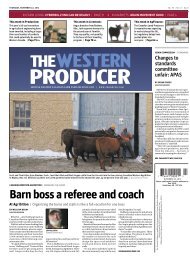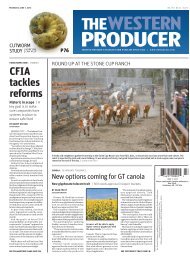You also want an ePaper? Increase the reach of your titles
YUMPU automatically turns print PDFs into web optimized ePapers that Google loves.
& OPEN FORUM<br />
FOOD SAFETY | LOCAL VERSUS LARGE-SCALE<br />
Local food proponents exploit XL recall<br />
BY JOSEPH QUESNEL<br />
It’s no surprise that local food<br />
activists are using the recent XL<br />
Foods beef recall to push their<br />
agenda.<br />
After all, the beef recall involving<br />
the plant in Brooks, Alta., affected<br />
more than 2,000 products and is<br />
being called the largest beef recall in<br />
Canadian history.<br />
Seventeen people have so far been<br />
diagnosed with E. coli in connection<br />
to meat from the plant.<br />
Local food activists, or locavores,<br />
believe food should be grown or produced<br />
in their local community or<br />
region. Local food is fresher, better<br />
tasting and more nutritious, they<br />
maintain. <strong>The</strong>y adhere to the “food<br />
miles” notion that shipping food long<br />
distances increases greenhouse gases.<br />
As a result, they avoid it.<br />
Yet there is no convincing evidence<br />
that local food is better tasting or<br />
more nutritious. We buy exported<br />
food because it is a better bang for<br />
our buck. Local food is often more<br />
costly.<br />
In the age of efficient inter-modal<br />
container shipping, growing things<br />
in better conditions elsewhere and<br />
shipping them over long distances<br />
often emits fewer emissions than<br />
growing food domestically.<br />
Experts say much more energy is<br />
used in food production than transportation.<br />
One such expert is geographer<br />
Pierre Desrochers, an associate professor<br />
at the University of Toronto<br />
and author of <strong>The</strong> Locavore’s Dilemma:<br />
In Praise of the 10,000-Mile Diet.<br />
Locavores insist local food is safer<br />
because it avoids modern, industrial<br />
HURSH ON AG<br />
KEVIN HURSH<br />
Contrary to what the 2011 Census<br />
of Agriculture indicates,<br />
there’s a youth movement in<br />
agriculture.<br />
Farm meetings that used to be<br />
dominated by grey hair or no hair<br />
now have a healthier proportion of<br />
young men and women.<br />
And if you think young people<br />
aren’t passionate about agriculture,<br />
check out Twitter.<br />
Yes, the census data continues to<br />
show a decline in the number of farm<br />
operators younger than 35. But being<br />
involved in the farm and even being<br />
the heir apparent to the operation<br />
doesn’t mean you’ll show up in the<br />
stats as a farm operator.<br />
Local food supporters must not forget that safe handling rules and<br />
processing methods originated from large-scale food production, says a<br />
policy analyst. | FILE PHOTO<br />
food production. What activists miss<br />
is the history of food production and<br />
how large-scale food production has<br />
made our food supply chain much<br />
safer than in the past.<br />
Desrochers points out that advances<br />
in science and medicine have<br />
eradicated food-borne illnesses that<br />
were once widespread.<br />
Proper canning, pasteurization,<br />
refrigeration, water chlorination,<br />
sanitary packing and food irradiation<br />
have made our food system the safest<br />
in human history.<br />
Local food activists romanticize the<br />
pastoral past, but modern scientific<br />
advances eliminated food problems<br />
that were once endemic.<br />
Most food borne illnesses requiring<br />
Plus, many in the older generation<br />
are hanging onto the farm into their<br />
late 60s and 70s. Farming is fun when<br />
you’re making money and the technology<br />
continually improves. Many<br />
older farmers enjoy working with<br />
their family and don’t have anything<br />
else they’d rather do.<br />
<strong>The</strong> stats may also be skewed by<br />
people retiring from professional<br />
careers or other business ventures to<br />
come back to the farm. Even though<br />
they’re mid-50ish, they are new<br />
farmers.<br />
Until five or six years ago, the farm<br />
didn’t look like a lucrative option<br />
compared to a job in the resource<br />
sector. Now, there’s some serious<br />
money being generated, particularly<br />
on grain operations.<br />
Profitable years were fleeting in the<br />
past, seemingly just a blip. This time,<br />
there’s a feeling, whether right or<br />
wrong, that the paradigm has shifted.<br />
It’s hoped that improved economics<br />
have become the norm.<br />
Young people who were helping<br />
out on the family farm while working<br />
elsewhere are spending more time<br />
hospitalization or leading to fatalities<br />
don’t come from contaminated food<br />
in large food-producing facilities.<br />
In Canada, it is estimated that there<br />
are 6.8 million cases of food-borne<br />
illnesses annually. A recent Conference<br />
Board of Canada study traces<br />
most of those illnesses to the food<br />
service industry, namely restaurants<br />
and households.<br />
Modern agriculture has brought<br />
modern food safety protocols.<br />
Desrochers recalled a visit he made<br />
to a Maple Leaf plant after the listeria<br />
outbreak and discovered how extensive<br />
the food safety protocols were.<br />
Thick safety protocol binders were<br />
regularly used at every step of the<br />
process.<br />
AGE STATISTICS | YOUTH MOVEMENT<br />
Young people are coming back to the farm<br />
on the farm. Many have quit their offfarm<br />
employment or business to<br />
farm full time, and they’re making<br />
their own farming investments.<br />
<strong>The</strong>re’s a noticeable distinction<br />
between farms that have a family<br />
successor and those who don’t.<br />
Interest by the younger generations<br />
gives a farm purpose and motivation.<br />
It also encourages new technology<br />
and innovation. Without a family<br />
heir, farms are much less likely to be<br />
expansion-minded.<br />
It’s also interesting to see how farms<br />
without family succession are targeted<br />
by other operations wanting to<br />
expand. It can be a little like vultures<br />
circling as they wait for the day when<br />
the land will be rented or sold. Old<br />
Pete and Audrey never had so many<br />
“friends.”<br />
<strong>The</strong> new problem for the younger<br />
generation is how to expand the farm<br />
when land prices and cash rents are<br />
skyrocketing. Everyone’s wish for<br />
profitability in the grain sector has<br />
been granted. <strong>The</strong> natural consequence<br />
is a lot of people wanting to<br />
farm more ground.<br />
THE WESTERN PRODUCER | WWW.PRODUCER.COM | DECEMBER 13, 2012<br />
Most of these elaborate procedures<br />
are far beyond the means of the average<br />
local farmer producing for the<br />
local farmers market.<br />
<strong>The</strong>re are economies of scale in<br />
food safety, too.<br />
Desrochers said large, centralized<br />
operations allow companies to hire<br />
staff that study and enact food safety<br />
protocols for a living, which would be<br />
impossible for smaller farming<br />
operations. So food safety is more<br />
likely compromised in smaller operations<br />
because they cannot costeffectively<br />
assemble the food safety<br />
equipment and know-how that larger<br />
operations can.<br />
<strong>The</strong> other advantage to large scale<br />
production is that large food firms<br />
are juicy targets if something goes<br />
wrong. Large firms such as Maple<br />
Leaf and JBS USA want to avoid foodborne<br />
illness outbreaks because they<br />
inevitably lead to litigation and<br />
reduced sales.<br />
Desrochers points out the obvious<br />
example of places such as India and<br />
sub-Saharan Africa where food poisoning<br />
is much more common.<br />
Open-air local markets are everywhere<br />
and eating food, especially<br />
meat, is risky.<br />
Obviously, the XL Foods recall<br />
means we need to be more vigilant.<br />
However, the answer is not to blow an<br />
incident out of proportion or ignore<br />
advances in food safety brought about<br />
by large-scale food production. Let’s<br />
maintain some perspective.<br />
Joseph Quesnel is a policy analyst<br />
with the Frontier Centre for Public<br />
Policy. This column was provided by<br />
Troy Media and has been edited for<br />
length.<br />
<strong>The</strong> common refrain six years ago<br />
was, “young people are never coming<br />
back to the farm when they can’t<br />
make a decent living.” Now the mantra<br />
is, “how can young people afford<br />
to get a start in farming at these land<br />
prices?”<br />
But many are trying and it’s leading<br />
to difficult family situations. What if<br />
there’s more than one son or daughter<br />
who wants to farm, but the operation<br />
just isn’t large enough to support<br />
that many people?<br />
And how do you treat non-farming<br />
children equitably? If Johnny is getting<br />
the farmland, equipment and<br />
the grain storage, it’s usually difficult<br />
to provide Susie and Jimmy with anything<br />
close to comparable value. This<br />
has always been a problem, but it<br />
becomes more difficult as land values<br />
rise.<br />
While there are new challenges, it’s<br />
great to see the youth movement in<br />
agriculture, even if it isn’t being captured<br />
in the official stats.<br />
Kevin Hursh is an agricultural journalist,<br />
consultant and farmer. He can be reached by<br />
e-mail at kevin@hursh.ca.<br />
DEMOCRACY | FREEDOMS<br />
Canadians<br />
losing faith<br />
in democracy<br />
11<br />
EDITORIAL NOTEBOOK<br />
JOANNE PAULSON, EDITOR<br />
Is government bruising<br />
our faith in democracy?<br />
I<br />
was recently in Toronto to celebrate<br />
the induction of Barry Wilson,<br />
our Ottawa correspondent,<br />
into the Canadian Agricultural Hall<br />
of Fame.<br />
Before the big night, however, I<br />
spent two days in Ottawa and was<br />
delighted to get Wilson’s Tour of Parliament<br />
Hill.<br />
Impressed as I was by all the statues,<br />
it was John Diefenbaker’s I stood<br />
before with awe. I recalled that he<br />
was instrumental in attacking apartheid,<br />
advocating for throwing South<br />
Africa out of the Commonwealth.<br />
I remembered that we owe our Bill<br />
of Rights to his dedication to civil<br />
liberties.<br />
To this day, his words of July 1, 1960,<br />
comprise my favourite quote of all<br />
time, and I still cannot read them<br />
without getting a lump in my throat.<br />
“I am a Canadian, a free Canadian,<br />
free to speak without fear, free to worship<br />
God in my own way, free to<br />
stand for what I think right, free to<br />
oppose what I believe wrong, or free<br />
to choose those who shall govern my<br />
country. This heritage of freedom I<br />
pledge to uphold for myself and all<br />
mankind.”<br />
I was not yet born when he said<br />
those words. I have lived in this country<br />
all my life as a beneficiary of that<br />
heritage. I became a journalist, as<br />
many do, because I believe in these<br />
freedoms, particularly to speak without<br />
fear.<br />
This is the basis of true democracy.<br />
This is why I was saddened to read a<br />
recent Globe and Mail story headlined,<br />
“Canadians quickly losing<br />
faith in their democracy.”<br />
Just 55 percent of Canadians say<br />
they are satisfied with democracy in<br />
this country, down 20 points from<br />
2004, according to research by the<br />
non-profit political participation<br />
group Samara.<br />
Twenty points in eight years is a<br />
lot. That should be a wake-up call to<br />
every politician in this nation. But it’s<br />
also up to us to tell them what we<br />
think, and we have the Supreme<br />
Court of Canada behind us on that.<br />
“Democracy cannot be maintained<br />
without its foundation: free<br />
public opinion and free discussion<br />
throughout the nation of all matters<br />
affecting the state within the limits<br />
set by the criminal code and the<br />
common law.”<br />
Believe it. And remember, you are<br />
free to choose those who shall govern<br />
your country. Diefenbaker said so.








